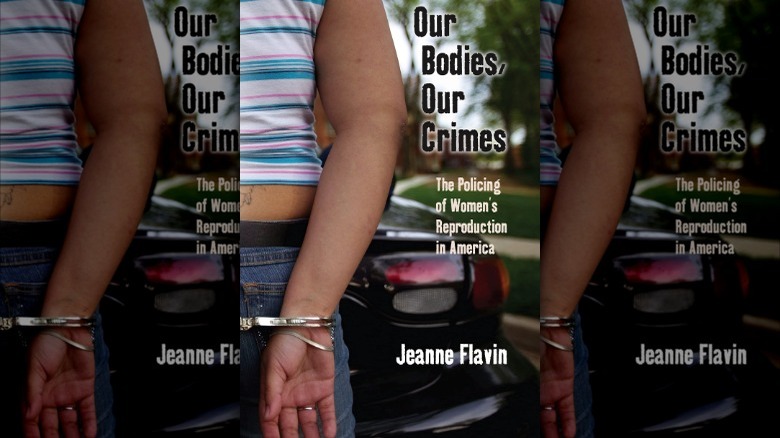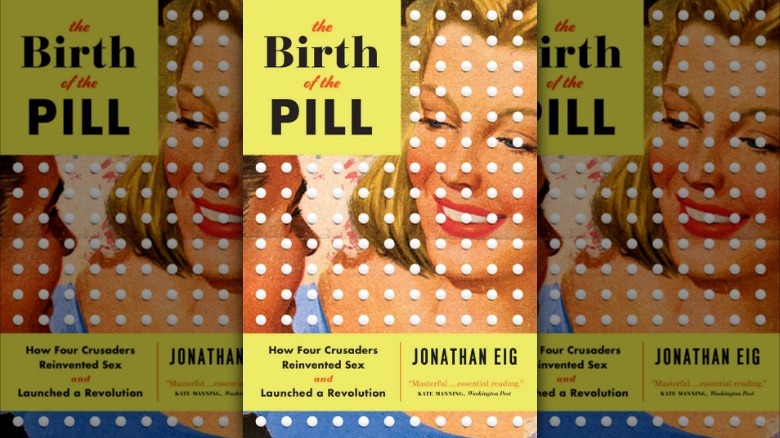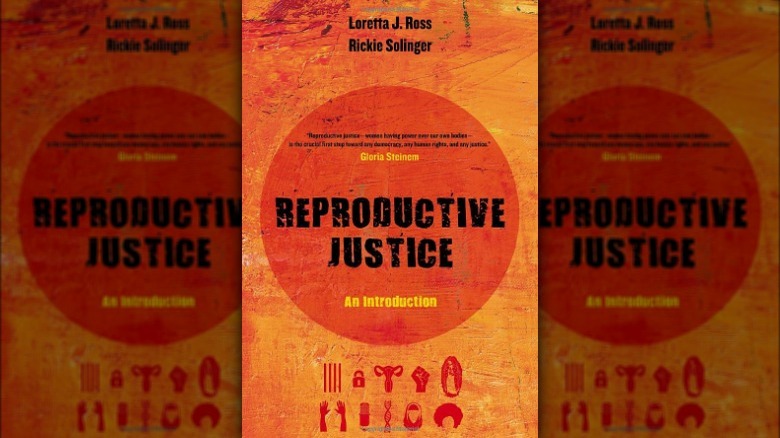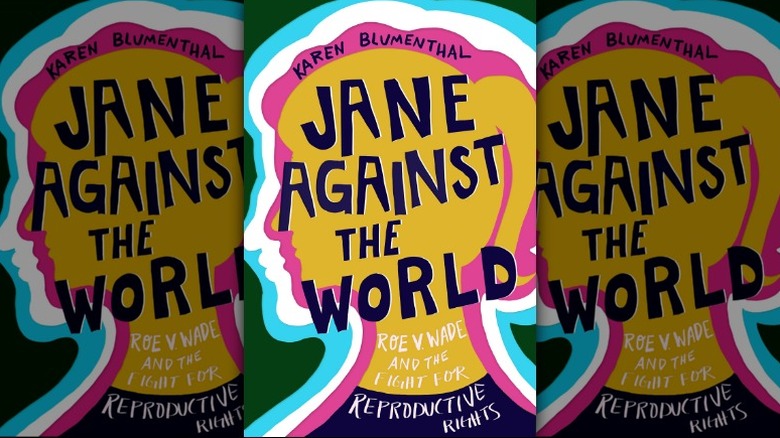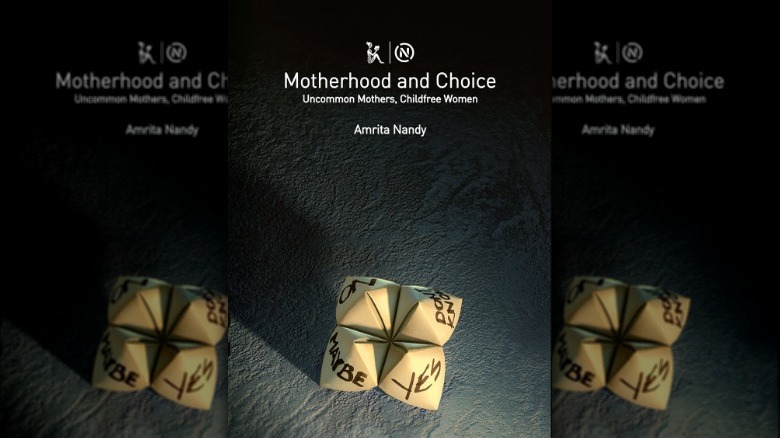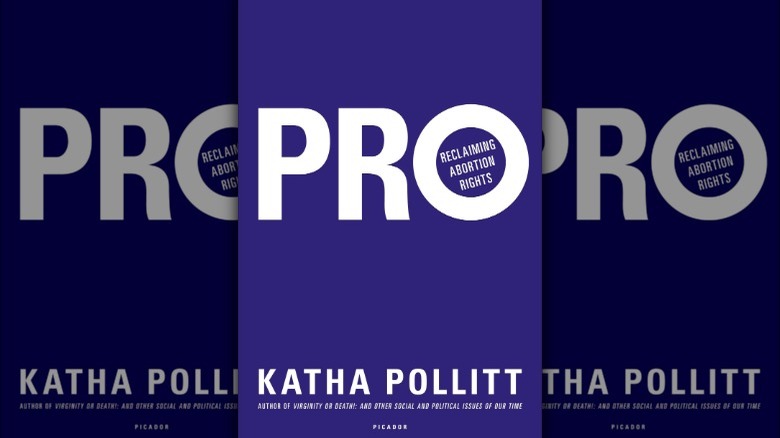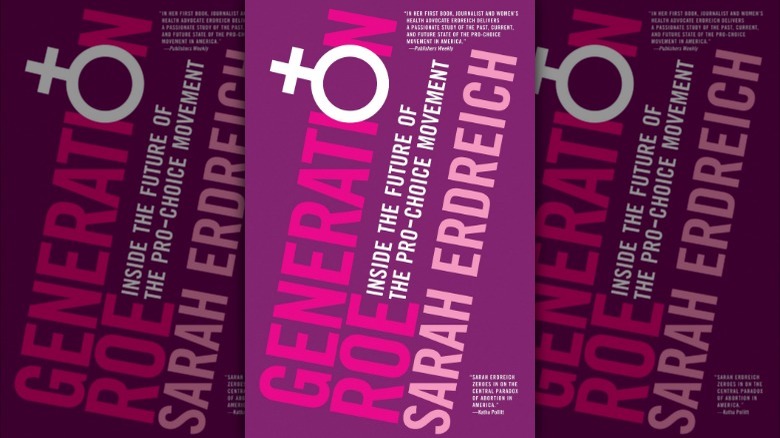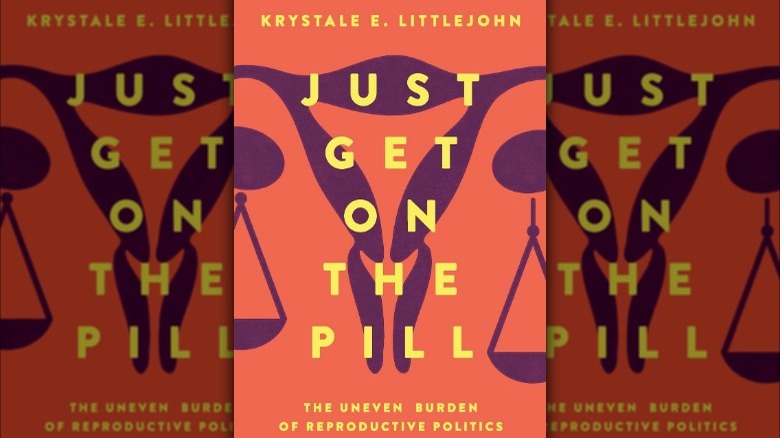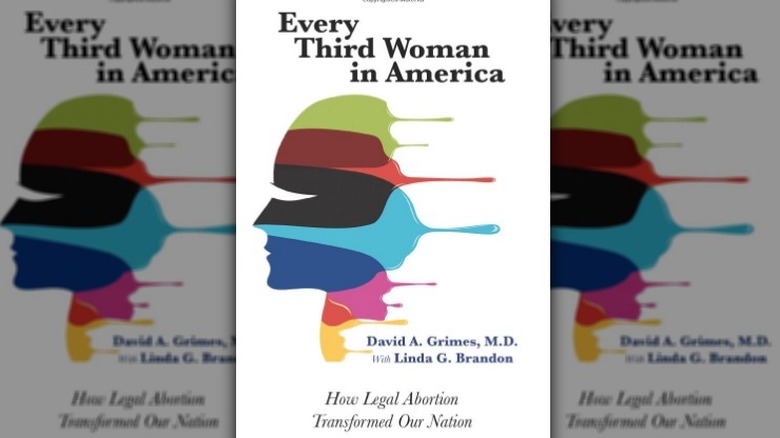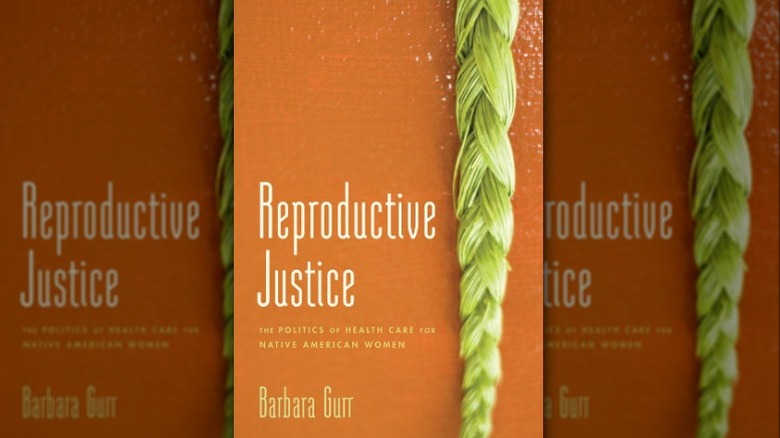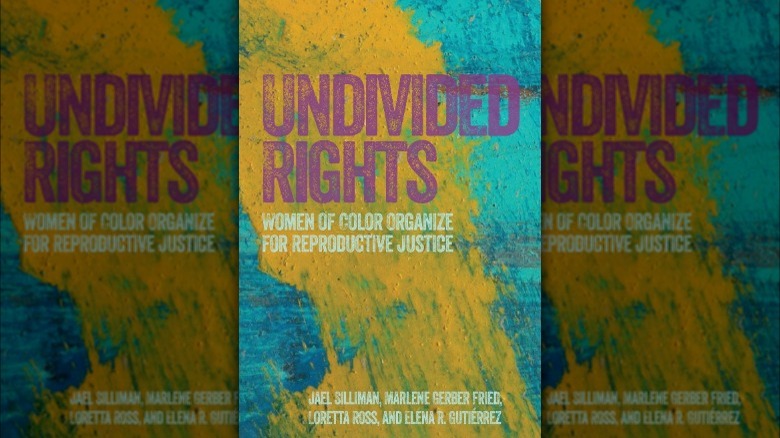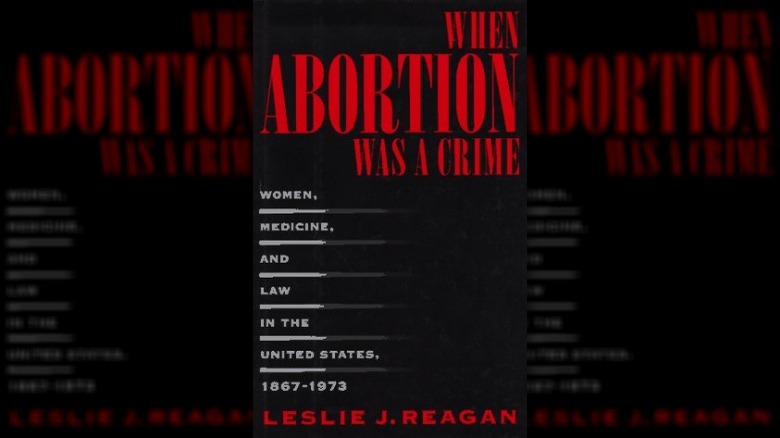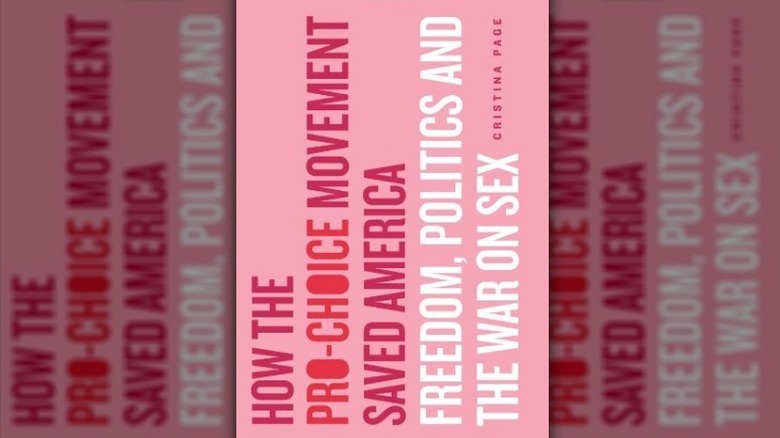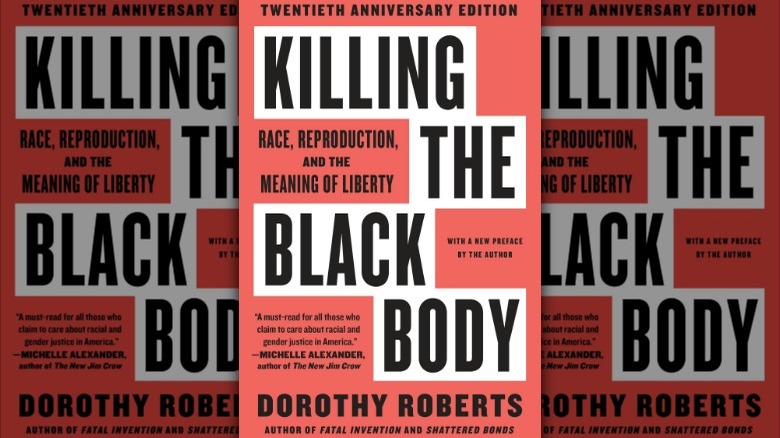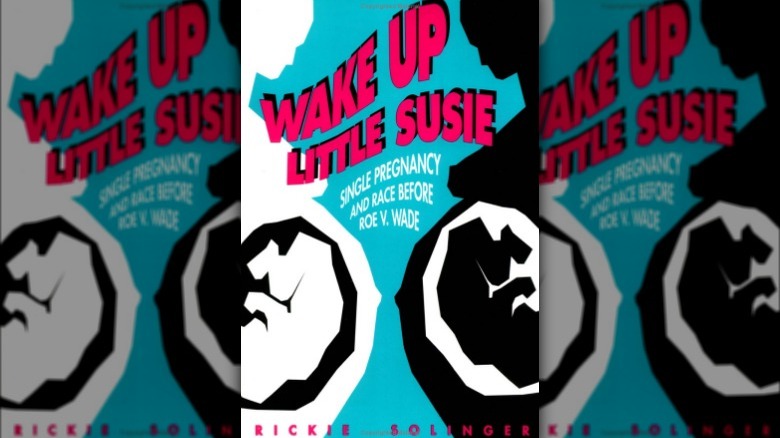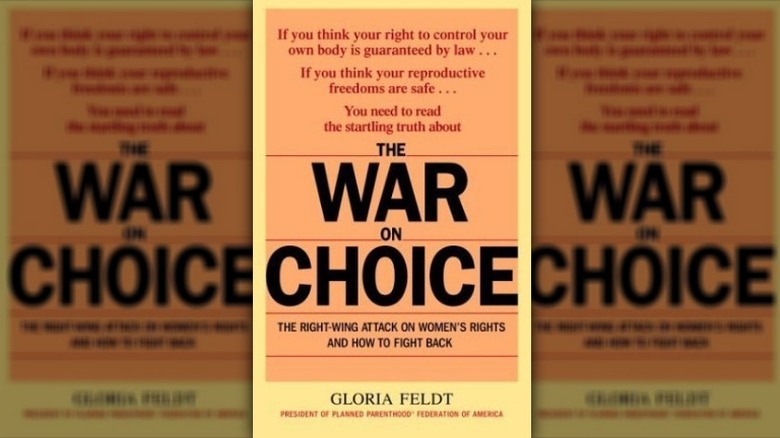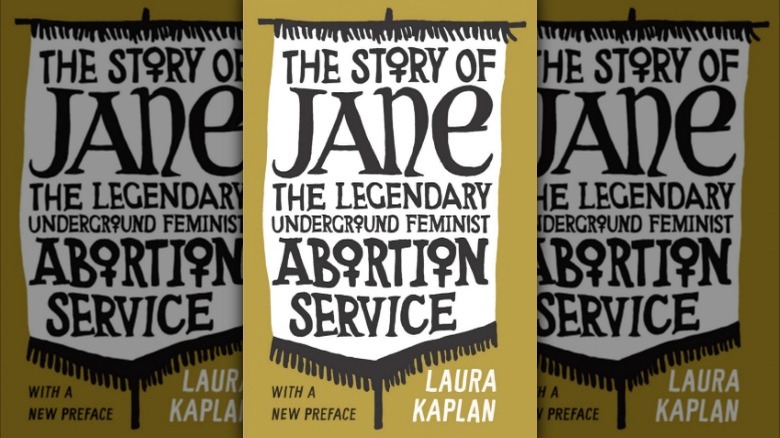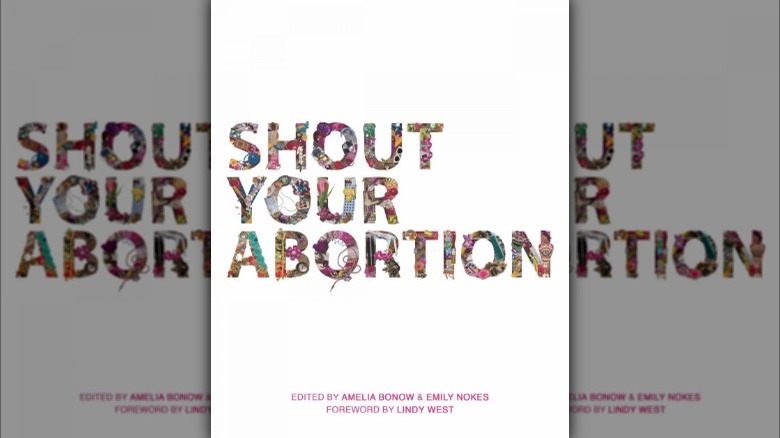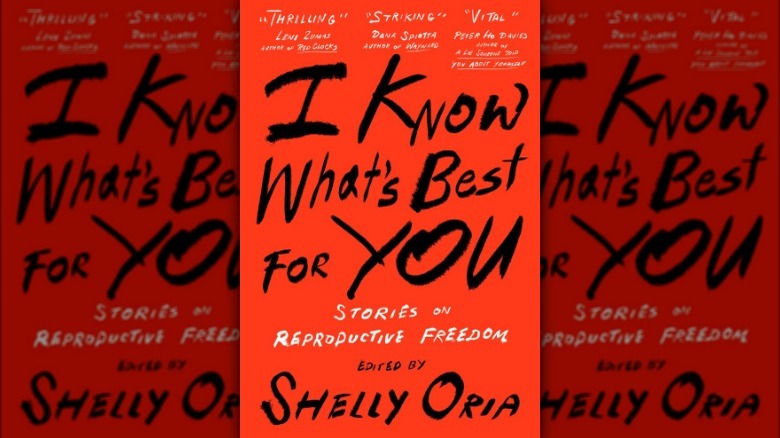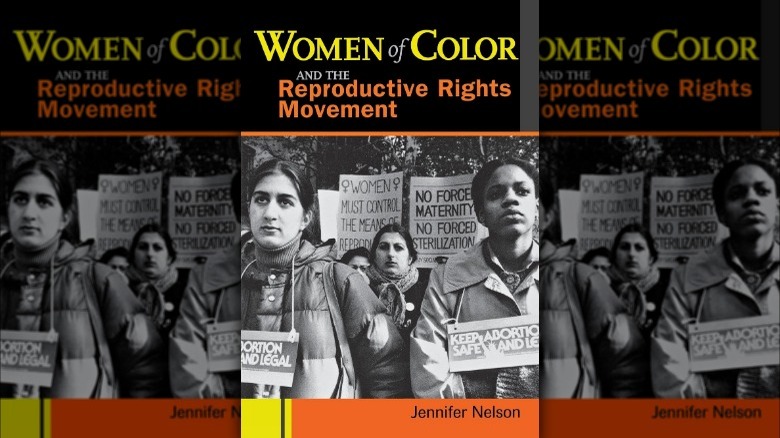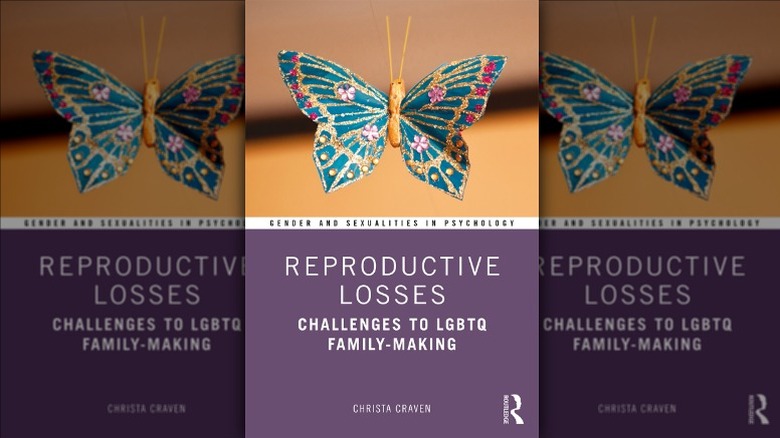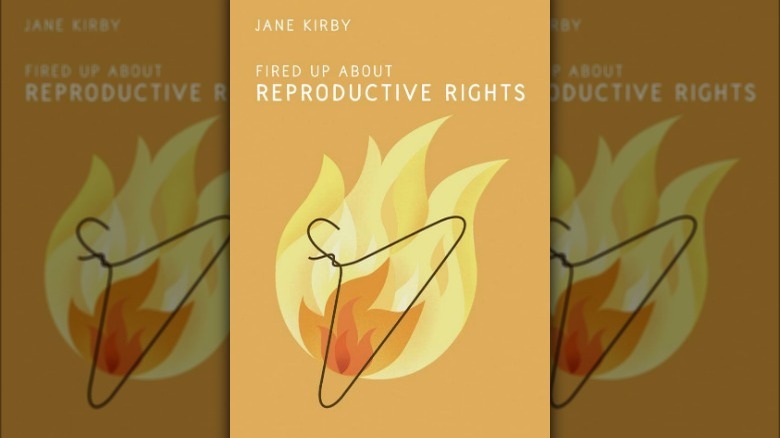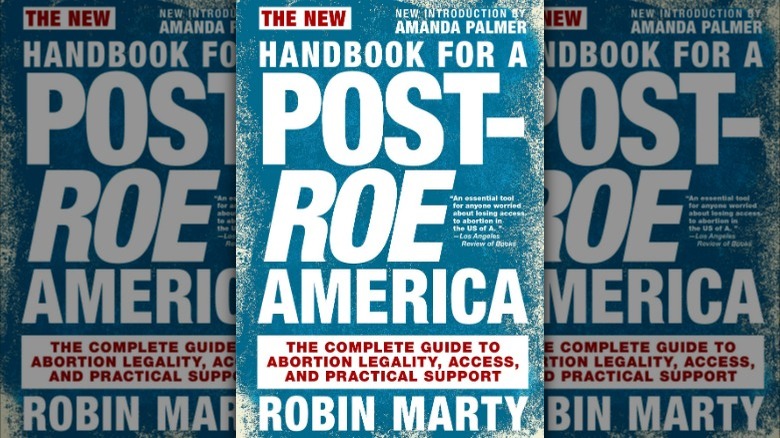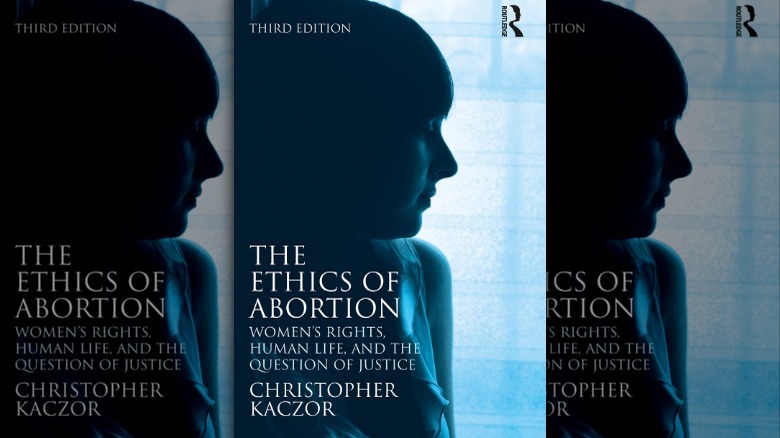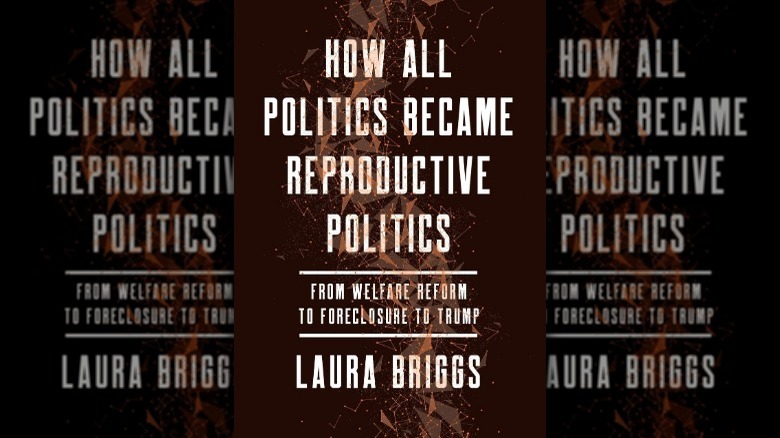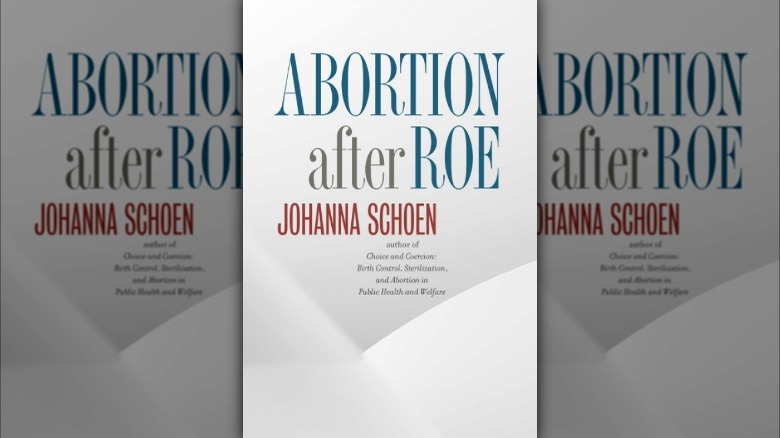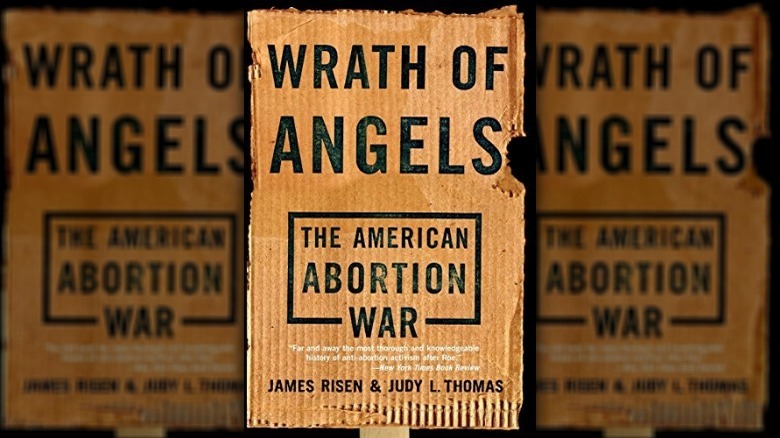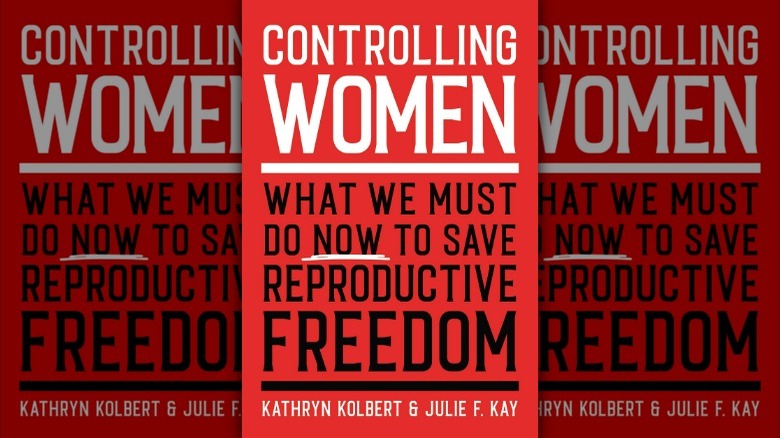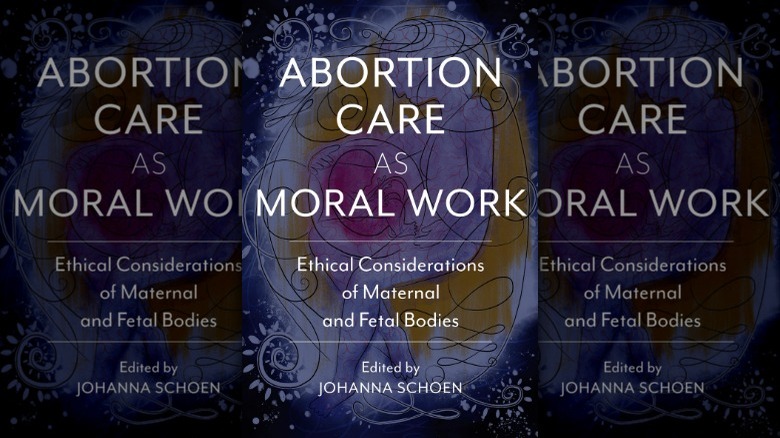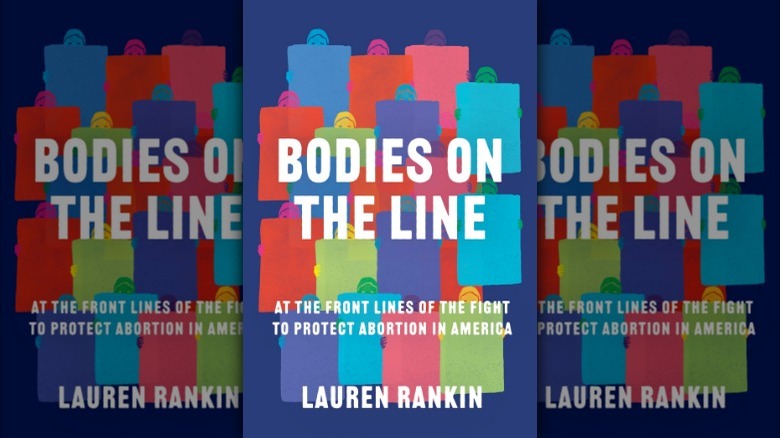30 Books That Put The Long, Complicated History Of Reproductive Rights Into Sharp Focus
We may receive a commission on purchases made from links.
Reproductive rights have long been a highly controversial yet important topic in the U.S. — more so since the unprecedented overturn of Roe v. Wade in 2022. The original 1973 ruling said that the right to liberty in the Constitution guaranteed a right to privacy, which essentially meant people should be able to make the choice as to whether or not they wanted to continue with a pregnancy. However, when Roe v. Wade was repealed, the Supreme Court put those rights back in the hands of the individual states, as they were given the power to make up their own minds when it came to how and when abortions could be administered.
With so many people having their rights stripped away, getting educated on reproductive history and the laws surrounding it is now more vital than ever before. One of the best ways to do that is by doing your research and making the most of the mounds of important literature that has been written on the subject. Women.com is here to help you do that, with 30 books we feel will give you the most comprehensive overview of the very long and complicated history of reproductive rights in America.
Our Bodies, Our Crimes, by Jeanne Flavin
As a professor of sociology at Fordham University and president of the National Advocates for Pregnant Women's board of directors, Jeanne Flavin knew what she was talking about when she wrote "Our Bodies, Our Crimes: The Policing of Women's Reproduction in America," published in 2009.
Flavin impeccably describes the harsh reality of motherhood many women in the U.S. experience and the consequences that can all too often stem from reproduction. In many cases, Flavin claimed, mothers and expectant mothers can be singled out by the court system if they fail to conform to society's views of traditional motherly norms. By writing about this, Flavin highlighted the dangers many women face if they don't have access to contraception or are not properly educated about reproduction and their rights.
The Birth of the Pill, by Jonathan Eig
In 2014, Jonathan Eig penned "The Birth of the Pill: How Four Crusaders Reinvented Sex and Launched a Revolution" to educate the world on the history of the contraception tablet, known to so many simply as "the pill". Eig uses his literary talents to explain the origins of the birth control method so many opt for today — whether it be to prevent unwanted pregnancies or tackle other issues such as painful or irregular menstruation or acne — telling the true story of how it sexually liberated so many.
This book makes use of a collection of four interconnecting stories about how the birth control pill rose to prominence, and the difficulties that came with it. It uses real-life, prominent players in the pill's conception, Margaret Sanger, Katharine McCormick, Gregory Pincus, and John Rock, to bring to life how this revolutionary method of birth control really came to be.
Reproductive Justice, by Loretta J. Ross and Rickie Solinger
"Reproductive Justice: An Introduction" does exactly what the title suggests, providing an overview of what you really need to know about reproductive rights in the U.S. over the decades. This introductory book by Loretta J. Ross and Rickie Solinger, which was released in 2017, is on university reading lists, not only across the country, but across the world. And for good reason.
This informative book puts the focus on exactly how reproductive rights have developed over the years, while it also spotlights how the experience has been different for people based on socioeconomic factors like sex, race, and class. In fact, the book actually tells the story of reproductive politics from the perspective of women of color, and how their experiences differ from the majority, as well as the struggles of many marginalized groups.
Jane Against the World, by Karen Blumenthal
It's hard to argue that Karen Blumenthal's "Jane Against the World: Roe v. Wade and the Fight for Reproductive Rights" has ever been more important and relevant than it is today. The book, released in 2020, takes a look at the fight for reproductive rights before the extremely controversial overturn of Roe v. Wade, recounting what the U.S. went through to get to that point.
The book is focused on the work of reproductive rights activist and lawyer Sarah Weddington, recounting how she was one of the pivotal figures for the cause in the 1970s. Blumenthal also introduces the world to several other key figures who had a hand in abortion rights laws, including Linda Coffee, Norma McCorvey, Sherri Chessen, Estelle Griswold, Harry Blackmun, Margaret Sanger, Jeanne Galatzer-Levy, Alan Guttmacher, and Jane Hodgson. The saddest part of it all, though? Knowing what happened to Roe v. Wade mere months after the book was published.
Motherhood and Choice, by Amrita Nandy
Amrita Nandy based her insightful 2018 book, "Motherhood and Choice: Uncommon Mothers, Childfree Women," on her dissertation research, after finding that many people found the politics surrounding reproductive rights and parenthood issues difficult to speak about publicly. "During the years of my research, I had so many women — and some men — tell me how they identify with the issues I raise yet find it difficult to talk about them because of the sanctity or moral aura they can have," she explained to Laura Carroll. "The book speaks from a diversity of sites that are all linked by a common theme of norms.
Though the book focuses on Indian parenthood, it prompts the reader to compare rights in the U.S. to those from around the world, especially when it comes to motherhood and what it truly means. "I think there is much to learn from them, besides thoughtfulness and courage," Nandy explained of her conversations with mothers. "Their understanding of love — beyond the body, genes and blood ties — is inspiring. Their experiments with caregiving carry insights. They give a new meaning to notions of 'belonging' and 'family'. Mostly, they all give us a deeper understanding of the choicelessness of women's choices."
Pro: Reclaiming Abortion Rights, by Katha Pollitt
Feminist and pro-choice activist Katha Pollitt took a deep dive into abortion rights with her insightful 2015 book, "Pro: Reclaiming Abortion Rights." In it, she presents the social struggles and injustices that led to Roe v. Wade and details why, in her opinion, abortions should be a right for anyone who needs one. Pollitt gives a refreshingly blunt and honest take on why she feels more people need to be vocal about being pro-choice, offering a perceptive opinion on the history of the ongoing abortion debate.
"I think the book speaks to a feeling among many pro-choice people that we need to be more assertive, less defensive. For a long time now abortion opponents have controlled the discourse," Pollit explained, talking about why she put pen to paper during a 2014 interview with Jewish Women's Archive. At the time, she claimed that she considered it to be "a crucial moment for abortion rights," and it has, sadly for so many, only become more critical since the book was first published.
Generation Roe, by Sarah Erdreich
In 2013, Sarah Erdreich published "Generation Roe: Inside the Future of the Pro-Choice Movement" to share her thoughts on what needed to happen to better relieve society of the taboos that come with discussions about abortion rights and being pro-choice. Though the book brings up several integral points relating to the cause, one of her most insightful statements relates to the issue of legality versus availability when it comes to abortion, and the issues so many faced prior to the overturn of Roe v. Wade.
"I would like all readers, regardless of ideology, to get that these are issues that need to be discussed. Reproductive rights affect everyone, not just women. They affect men and the decisions of one generation affect another," she told Hazlitt. "I think there's a continuum, and having access to reproductive rights also means having access to contraception. We can only benefit from talking about it more."
Just Get on the Pill, by Krystale E. Littlejohn
Krystale E. Littlejohn's 2021 book "Just Get on the Pill: The Uneven Burden of Reproductive Politics" uses its blunt title to raise awareness of why women bear the majority of the burden when it comes to contraception, particularly those able to take the contraceptive pill. Littlejohn questions why so many people who menstruate are simply expected to take the contraceptive pill over opting for other methods available to their sexual partners, zeroing in on the potential inequalities contraception choices can cause between men and women.
As Littlejohn explained to Deborah Kalb, "I wrote 'Just Get on the Pill' because I wanted to give voice to women's experiences having their bodily autonomy and reproductive freedom violated." Littlejohn explained that she wanted to interview people who have made contraception choices about how they feel, noting, "Writing 'Just Get on the Pill' gave me the opportunity to shed light on frustrating and unjust experiences that many women had that aren't often talked about in our society."
Every Third Woman in America, by David A. Grimes
As a gynecologist and epidemiologist, Dr. David Grimes has an extremely insightful perspective on legal abortions in the U.S. and how the availability of safe abortions drastically changed reproductive rights across the nation. As a pro-choice activist, Grimes attempts to dispel some of the biggest myths about what abortion is — and what it isn't — in 2014's "Every Third Woman in America: How Legal Abortion Transformed Our Nation," by including accurate medical information everyone needs to know.
Sadly, like many of us, Dr. Grimes couldn't predict the overturn of Roe v. Wade, which makes the book's examples of how safe and legal abortions helped so many all the more bittersweet. When asked if he thought there would ever again come a day when people in the U.S. would not have access to safe and legal abortions, Dr. Grimes told Time in 2017, "No, I don't think we'll see that. [But] these efforts to limit access can have the same effect."
Reproductive Justice, by Barbara Gurr
Barbara Gurr, feminist and associate professor in residence at the Women's, Gender, and Sexuality Studies Department of the University of Connecticut, examines the sexual healthcare experiences of indigenous people across the U.S. in "Reproductive Justice: The Politics of Health Care for Native American Women." First published in 2014, the book offered the perspective of the marginalized group when it came to what their access to such care is really like and how Native American people looking to get an abortion have traditionally been treated.
We particularly admire the way Gurr puts the main focus on Native American women, who, in all too many cases in society, feel unseen or unable to tell their stories — particularly regarding traditionally taboo subjects such as sexual health. Not only does Gurr ask Native American women directly about their experiences with aspects of sexual health like contraception and abortion, but she also brings much-needed attention to a range of other incredibly important subjects, such as the treatment they were able to access after horrific crimes like sexual assault.
If you or anyone you know has been a victim of sexual assault, help is available. Visit the Rape, Abuse & Incest National Network website or contact RAINN's National Helpline at 1-800-656-HOPE (4673).
Undivided Rights, by Jael Silliman, Marlene Gerber Fried, Loretta J. Ross, and Elena R. Gutiérrez
Similar to the book highlighted in the previous slide, "Undivided Rights: Women of Color Organizing for Reproductive Justice" details the experiences of marginalized groups in relation to reproductive rights. The 2016 book explains how women of color (including members of African American, Native American/Indigenous, Latina, and Asian and Pacific Islanders communities) have been at the forefront of pushing for reproductive justice in the U.S. for decades, as well as how they have experienced the changes in sexual health attitudes and laws.
The book shares the truth about how so many women of color fought against things like white supremacy, capitalism, and patriarchy to fight for what they felt was right, not only for themselves but for others. "These contemporary struggles for reproductive justice arise from a long history of oppression and resistance, beginning before 20th-century battles to legalize contraception and abortion," the authors explained to the Center for American Progress. "Thus, each pair of case studies is preceded by an introductory chapter that grounds the organizational histories in the larger history of the community."
When Abortion Was a Crime, by Leslie Reagan
In "When Abortion Was a Crime: Women, Medicine, and Law in the United States" (a title that is sadly all too appropriate in the U.S. today), Leslie Reagan writes about what abortion was really like in the country before Roe v. Wade came to be. Of course, as we know all too well, it's been overturned again since the book was published in 1997, which makes it incredibly timely in showing us how the U.S. has stepped forward, and then back again. This book actually looks back over around 100 years of abortion laws and rights, including informing readers about what it was really like to terminate a pregnancy in the days before abortion was not only illegal but also not widely spoken about.
In 2022, Reagan offered an update on her work to Current Affairs, sharing her thoughts on the overturn of Roe v. Wade and what it really means for people in the U.S. "Abortion will go underground," she said. "There will be some safe practitioners, and some who are not safe. And women will also turn to doing it themselves, which can be successful, but isn't always."
How the Pro-Choice Movement Saved America, by Cristina Page
Reproductive rights activist Cristina Page writes about the pro-choice movement and how activists looking to make a change provided freedom for so many when it came to their sexual health in "How the Pro-Choice Movement Saved America." When the book hit the shelves in 2006, it gave detailed insight into how an increased focus on sexual matters and more discussion of the topic in society helped people across the U.S. at that time. The book provides various examples (through the likes of thorough research and first-hand investigative work) of how laws and education became a lifeline for so many in terms of their choices relating to body autonomy, as it frames the positive impacts the pro-choice movement really had across the nation in an honest and open way.
This incredibly insightful book is a must-read for all those looking for solid evidence to back up their pro-choice beliefs, as well as a great resource for those looking to be better informed about the pro-choice movement.
Killing the Black Body, by Dorothy Roberts
With the spotlight firmly on Black people's involvement with reproductive rights, race, gender, and the law, University of Pennsylvania scholar Dorothy Roberts' "Killing the Black Body: Race, Reproduction, and the Meaning of Liberty" brought Black people's experiences to the forefront. The ahead-of-its-time 1998 book not only focuses on marginalized groups in relation to more modern abortion rights, but also in the context of systematic racism and slavery. It offers stark but important research on the way those who are able to give birth were often forced into sterilization by slave owners, as well as how Black people often feel forgotten in the reproductive rights movement.
"Fighting the criminalization of Black moms and pregnant women during the so-called crack epidemic in the U.S. prompted me to explore the numerous policies that were founded on vilifying stereotypes about Black mothers and blaming Black women's childbearing for a range of social ills, and then adopting punitive and villainizing actions," Roberts told The Guardian in 2022. "That's what inspired me to write 'Killing the Black Body.'"
Wake Up Little Susie, by Rickie Solinger
In "Wake Up Little Susie: Single Pregnancy and Race Before Roe v. Wade," author and historian Rickie Solinger looks back at pregnancy and reproductive rights in the immediate aftermath of World War II and the societal issues pregnant, unwed mothers faced. The book particularly brings to the forefront the different obstacles white and Black mothers faced at the time, when it came to essentially being forced into parenthood. Black mothers were often unable, not only to get legal abortions, but also to give up their children for adoption.
Solinger opened up about the process of writing the incredibly important book, which came out in 2000, to The Mother's Movement Online, sharing that he found more purpose the deeper into his research he got. "I was completely catalyzed, writing about how and why different groups of women had different reproductive experiences in the United States, and what race has had to do with these differences," he explained. "I wrote about how and why these experiences changed over time. I wrote about how our recent past has clarified the fact that women's legal capacity to manage their own bodies has always been key to their status as full citizens."
The War on Choice, by Gloria Feldt
The 2007 book "The War on Choice: The Right-Wing Attack on Women's Rights and How to Fight Back" by feminist and pro-choice supporter Gloria Feldt, aims to dispel the myths that have been injected into society's belief system when it comes to women's reproductive rights. The book highlights some of the many falsehoods those who are pro-life have shared when it comes to reproductive rights, while also looking back at how those at the forefront of the equality movement have dealt with their opposition over the years.
As the former president of Planned Parenthood Federation of America and cofounder and president of Take The Lead, Feldt expertly uses her years of experience to make the fundamental differences between those who believe in equal women's rights and those who don't the focal point. This book also does an expert job of teaching women how, should they choose to, they can continue to fight for reproductive rights in society.
The Story of Jane, by Laura Kaplan
Laura Kaplan uncovers the truth about what it was really like to get an abortion when, pre-Roe v. Wade and its subsequent overturning, abortion was illegal. In "The Story of Jane: The Legendary Underground Feminist Abortion Service," Kaplan recounts what many women really went through when they had no option but to have dangerous abortions at home. The 2019 book tells the story of Jane, a covert abortion service that offered help to those looking to terminate their pregnancies at a time when it wasn't publicly spoken about or accepted.
Kaplan was actually a member of Jane, and her book tells a new generation about what really happened back then, and, tragically, what could still happen following the overturn of Roe v. Wade. "We wound up being a totally woman-run organization that provided counseling, supportive services and the abortions themselves," she told WBUR. "And we did [dilation and curettage] abortions and induced miscarriages."
Shout Your Abortion, edited by Amelia Bonow and Emily Nokes
"Shout Your Abortion" is a touching book made up of real-life stories from people who have had abortions, or experiences with abortions. It compiles several abortion stories that were told back in 2015 as part of the #ShoutYourAbortion movement that took over social media, after the U.S. Congress shared plans to cut Planned Parenthood funding. Not only does the book feature stories, but it also makes use of other media, such as photos and essays, to put a human face on the pro-choice movement and eliminate the shame and stigma that can often surround issues relating to reproductive rights.
Released in 2018, "Shout Your Abortion" is actually part of a much bigger movement, which has become stronger than ever in the wake of the decision to overturn Roe v. Wade. "I don't want this hashtag to be interpreted as a directive. I would never implore any women to speak in the way that I am — I know I'm lucky to do so," Shout Your Abortion co-founder Amelia Bonow explained to Vice. "I think the hashtag also works for women who are not shouting their abortions, but are standing behind our right to do so. It's all about reducing stigma and starting the conversation."
I Know What's Best for You, edited by Shelly Oria
Shelly Oria collected a range of media, from essays to poems, in 2022's "I Know What's Best for You: Stories on Reproductive Freedom," which collates stories that need to be told from the people who have lived through abortion and other issues related to reproductive rights. The book also brings attention to marginalized voices and what they've lived through which, as Oria explained to Electric Lit, was one of her main aims when collecting stories. "The need to spotlight all these voices is also entirely grounded in the here-and-now: in this new landscape where people often have to travel to another state for an abortion, miss days of work, figure out childcare for that time if they're parents — who bears the brunt?" she shared. "We know that's lower income folx [sic]. And we know this type of burden always falls disproportionately on [people of color]."
Oria added that she wanted the book to be a tool for creating more cultural conversation around the subject. "I'm wishing for, one in which as a society, we recognize how insidious gender-based violence is, and start seeing the various manifestations of that violence as interlinked," she said.
Women of Color and the Reproductive Rights Movement, by Jennifer Nelson
In 2003, Jennifer Nelson released "Women of Color and the Reproductive Rights Movement" to bring attention to what women of color have been through in the struggle for fair reproductive rights. The book, which is on many academic syllabi around the world, is made up of five stories relating to women's reproductive rights, which are told through the medium of interviews and other materials. Each one has a loose link to the others. The book's main focus is on what was happening in the U.S. during the 19th century, when feminism began to take a strong hold and the fight for rights really came to the forefront in society.
Nelson also uses her skills to share the important work done by a number of pro-choice groups of the time, including CARASA, the Redstockings, the Third World Women's Alliance, and the National Welfare Rights Organization.
Reproductive Losses, by Christa Craven
In "Reproductive Losses: Challenges to LGBTQ Family-Making," Christa Craven puts the spotlight firmly on the LGBTQ+ community in a discussion of reproductive rights and how their experiences may differ from cis people's. The book takes a particularly deep dive into how many members of the LGBTQ+ community have dealt with difficult losses because of stillbirth, sterility, miscarriage, adoption limits, and infertility, all through extremely personal stories. Craven puts a particular onus on how support groups for those dealing with such tough losses usually aren't geared toward the LGBTQ+ community.
"All of the advice and examples of commemoration come from LGBTQ+ parents, families, and individuals who have experienced reproductive loss," Craven explained of the project via its website, which also features commemorations and words of advice. "There is no single unified set of guidance, nor is there always adequate language to convey the complexity of emotional experiences."
Fired Up about Reproductive Rights, by Jane Kirby
We love the title of Jane Kirby's 2017 book, "Fired Up about Reproductive Rights," which even uses the notorious coat hanger symbol (on fire) on the cover as a stark reminder of the lengths many people had to go to in order to have an abortion. Kirby explained to Open Book that her aim with her work was to introduce young people to vital reproductive rights issues and make the subjects accessible, with this book, in particular, serving as a primer for those wanting to learn more. "I tried to make the book very accessible, so that it can be read by teenagers or anyone looking for a simple primer on what can be quite complicated issues," she explained.
"While the focus is on abortion and coercive sterilization, I frame these issues as part of bigger social justice issues — like the fights against patriarchy, racism and colonialism — by drawing on an intersectional, reproductive justice framework advanced by women of colour," Kirby added.
New Handbook for a Post-Roe America, by Robin Marty
The original 2019 edition of Robin Marty's unique "New Handbook for a Post-Roe America: The Complete Guide to Abortion Legality, Access, and Practical Support" was updated in 2021 to reflect the ever-changing developments surrounding reproduction rights in the U.S. With a foreword written by Amanda Palmer, this edition, as the title suggests, acts almost as a how-to guide for all those looking for more information on how to shape their own lives when it comes to reproductive rights and fighting for what you believe in.
Amongst the hard-hitting subjects this book offers information on are alternatives to Planned Parenthood and even advice on how to stay safe on social media. Marty also details how to deal with reproductive rights emergencies that may crop up in the reader's own life, as well as sharing detailed information on all aspects of abortion care.
The Ethics of Abortion, by Christopher Kaczor
Christopher Kaczor debates important and sometimes even unanswerable questions surrounding reproductive health in "The Ethics of Abortion: Women's Rights, Human Life, and the Question of Justice." He brings to the forefront topics such as "Does Personhood Begin after Birth?", "Does Personhood Begin at Birth?" and even "Does the Human Embryo Have Rights?" Kaczor appeals to reason, rather than religion, in his argument that abortion is morally wrong. The book, first released in 2010, offers a different view on abortion than the other books on Women's list — which allows the reader to potentially understand the complicated history of U.S. reproductive rights from another perspective and its complex relationship with ethics.
"I hope that my book can prompt people to reconsider the issue, to reconsider whether abortion is choiceworthy," Kaczor told the National Review. "Furthermore, thoughtful people, those concerned with justice and the promotion of authentic human flourishing, have a serious obligation to help all people, especially women in crisis-pregnancy situations, to find a way to provide concrete service and aid to everyone involved."
How All Politics Became Reproductive Politics, by Laura Briggs
Providing a modern take on reproductive rights via "How All Politics Became Reproductive Politics: From Welfare Reform to Foreclosure to Trump," Laura Briggs, professor in the Women, Gender, and Sexuality Studies department at the University of Massachusetts Amherst, likens reproductive rights and responsibilities to issues of general human rights. In each chapter, Briggs highlights a different issue and discusses in detail the labor crisis involving time, wages, and reproduction.
The book explains how, in Briggs' opinion, many social issues have derived from the "demonization of the reproductive labor of people understood to be women, particularly women of color, and all people who do care work." Briggs also discusses how the election of the 45th President of the United States, Donald Trump, influenced reproductive rights, linking Trump's appeal to straight, white voters with many of the issues marginalized groups have faced when it comes to reproductive politics.
Abortion After Roe, by Johanna Schoen
"Abortion After Roe," which was released in 2015, explains in detail what happened in the U.S. after Roe v. Wade, which now provides a somewhat halcyon look back at the way many people felt liberated in the time before the case was overturned in 2022. Johanna Schoen, a professor of history at Rutgers University, also discusses the impact abortion laws had on society at the time, and the rise in anti-abortion movements that happened subsequently. Coming from a historian's perspective, the book offers a slightly different take on the pro-life and pro-choice fight, as it actually puts attention on independent abortion providers and their experiences.
Much of Schoen's work, including this book, relates to her desire to educate society on the history of reproductive laws. "Education and the ability to discuss the positive aspects of abortion publicly are crucial to our ability to remove the shame and stigma surrounding abortion care, correct the misconceptions about abortion, and offer women the opportunity to consider their reproductive choices without the misinformation and shame that currently prevail," she explained in a news release from Rutgers.
Wrath of Angels, by James Risen and Judy Thomas
Journalists James Risen and Judy Thomas do an excellent job of taking us back to the 1980s and 1990s, educating the world on the struggle many pro-choice activists in the U.S. faced in keeping legal abortion clinics safe and open to those in need. "Wrath of Angels: The American Abortion War," which was released in 1999, documents the plight of the Rescue movement, in which pro-choicers had to physically block the doors of some abortion clinics in order to protect them from pro-life believers who wanted to see them shut down.
In the historical book, Risen and Thomas, who were both journalists covering the societal discourse at the time, examine how civil disobedience over abortion laws came to be. They also take a look back at how events, in several locations, turned violent before the Freedom of Access to Clinic Entrances Act came to be in 1994.
Controlling Women, by Kathryn Kolbert and Julie F. Kay
If you're looking to learn more about reproductive rights and the fight so many have upheld for decades, "Controlling Women: What We Must Do Now to Save Reproductive Freedom," by Kathryn Kolbert and Julie F. Kay, is for you. Kolbert and Kay are actually lawyers at the forefront of the reproductive law movement, and their 2021 book takes a look at what can be done to ensure people's rights remain protected, especially important following the overturning of Roe v. Wade.
"Throughout the book, it's really looking at how the opposition sees the issue, and that many people who believe strongly that abortion should not be a decision made by a woman or a pregnant person are ones who have very traditional senses of the world of gender roles," Kay explained while speaking with Author Events. The book also details Kolbert and Kay's beliefs that abortion is not a religious issue, and is instead more related to philosophy and differing opinions on when exactly life begins.
Abortion Care As Moral Work, edited by Johanna Schoen
Bringing together a number of stories related to abortion (and the second book on our list by Joanna Schoen), "Abortion Care As Moral Work: Ethical Considerations of Maternal and Fetal Bodies" shares statements from a wide range of experts — from counselors to clinic owners and historians — to give a true perspective on the subject. Each one shares their own story about the antiabortion movement, and how it has affected reproduction rights, with a focus on the notorious Dobbs v. Jackson Women's Health Organization Supreme Court case of 2022. Dobbs v. Jackson is actually what resulted in the overturn of Roe v. Wade, and, as Schoen explained to Nursing Clio, "[The book illustrates] how both groups think about ethical frameworks surrounding abortion care."
Schoen explained that she edited the collection as a way to put voices who maybe wouldn't always be heard in the spotlight, potentially helping thousands of people who feel their reproductive rights have been taken away. "Our silence about these personal and emotional motivations has meant that antiabortion activists were able to dominate the rhetoric surrounding abortion care. This has significantly contributed to the stigmatization of abortion, further silencing women and their physicians," she shared.
Bodies on the Line, by Lauren Rankin
If you're looking for a super up-to-date take on the state of reproductive laws in the U.S. "Bodies on the Line: At the Front Lines of the Fight to Protect Abortion in America," by Lauren Rankin, is the perfect place to start. The 2023 book offers a comprehensive view of the state of reproductive rights across the nation in the wake of the overturn of Roe v. Wadeand shines a harsh light on what the decision really means for Americans.
Rankin collected stories from those on the front lines, clinic escorts, about the effects of the Supreme Court decision, to explain why the need for safe and legal abortions is so imperative. The author, who was once a clinic escort herself, also tells the important details of the fight to get Roe v. Wade instated in the first place, and the opposition the pro-choice movement put up.

